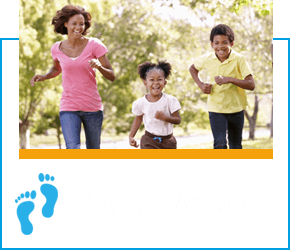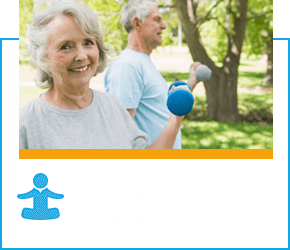
Physical activity and exercise are a great way to feel better, gain health benefits, and have fun. It gives you a chance to unwind, enjoy the outdoors, or simply engage in activities that make you happy. Physical activity can also help you connect with family or friends in a fun social setting. Find a physical activity you enjoy, and just do it, every day. As a general goal, aim for at least 30 minutes of physical activity every day. Remember, ALL movement counts, not just exercise!

Forgiveness is a gentle process of letting go of grudges and bitterness or reducing resentments and motivations toward anger and revenge. Forgiveness is a choice you make to give up anger and resentment while acknowledging that you were hurt. It is a choice and is for you, not for the forgiven. Studies have shown that voluntarily giving up bitterness and practicing forgiveness can have a positive impact on our health, including improved blood pressure, decreased stress, improved relationships, and more.

Food and drink portions have increased dramatically over the past few decades, changing the norms for individuals. It is important to understand food portion sizes because overeating can adversely affect our health. A portion is the amount of food on your plate. A serving is a precise amount of food defined by common measurements such as cups, ounces, or tablespoons. A serving is generally a recommended amount, and often found on food labels. Focus on increasing the portion size of your healthy foods while decreasing the portion size of unhealthy foods. Eat mindfully and enjoy your food.

Preventive services are an important part of improving and maintaining your health care. Screening test results provide a snapshot of your current health and reveal opportunities to make healthy changes. Screening tests can also help detect problems early, which is often the key to successful treatment and possible reversal or worsening of problems. Keep in mind that screening recommendations change periodically. Also, unnecessary screening may lead to unnecessary testing, expenses, or anxiety. Be sure to check with your health care provider about what tests you should have.

There are several factors that can interfere with a good night's sleep - work, family commitments, stress, and household chores. In turn, sleep impacts our personal health. It may be obvious that inadequate sleep makes us more irritable and not able to concentrate. Sleep also impacts our weight, immune system, and our risk for serious medical illnesses like diabetes, heart disease, cancer, and depression. Consider sleep as you work toward personal goals and for long-term health benefits.

The experience of trying new things and learning new skills or knowledge can contribute to our personal development and growth. You may discover your purpose, increase your motivation, and build new relationships through novel experiences. Trying new things leads to increased confidence and self-esteem. It reduces boredom, loneliness, and is a major driver in personal growth. Education may be the most important variable to improve health and prolong longevity - even more valuable as we age.

Flexibility and strength aid in improving wellness, performance, preventing injury, and achieving personal fitness goals. Flexibility may help decrease the risk of injuries, release pain associated with musculoskeletal stiffness, and improve sport-specific performance. The loss of lean muscle mass can be counteracted by introducing regular strength training. You can use a variety of types of 'resistance' to improve strength: Your own body weight, free weights, resistance bands, machines, and even water.

Research shows laughter offers us health benefits that can impact your body in a positive way. Unlike humor, laughter is a physical act. It crosses all boundaries of race, culture, gender, and socioeconomic status. Hearty belly laughter improves respiration, increases circulation, stimulates the immune system to help resist disease, and enhances your aerobic capacity. Laughter is a great tool to keep in our toolbox of positive coping strategies. Laughter reduces stress by providing a positive way to view problems and puts us in the present moment where we can experience happiness.

Having close family and friends has far-reaching benefits for your health. A strong social support network can be critical to help you through the stress of tough times, whether you've had a bad day at work or a year filled with loss or chronic illness. Spending time with people helps ward off loneliness, gives you a sense of belonging, and increases your sense of self-worth. Family and friends can also encourage you to change or avoid unhealthy lifestyle habits. Time spent with family and friends is precious and free. Don't put relationships on the back burner, but rather make them a priority.

Addiction impacts your personal health, safety, job performance, and personal finances. It can also impact others through strained relationships or a change in mood. Understand that by addressing the behavior, you're helping yourself and others. To start, we need to recognize and be mindful of our current behaviors and know when we're in excess. Identify when you've lost control or you continue a behavior despite the harm it causes you or your loved ones. You can then move into a stage of addressing your addictive behaviors.

It is normal for our minds to wander throughout the day. In fact, studies have shown that the average person is distracted for nearly fifty percent of the day. Spending too much time planning, problem-solving, daydreaming, or thinking negative or random thoughts can make you more likely to experience stress, anxiety, and symptoms of depression. Practicing mindfulness exercises can help you direct your attention away from this kind of thinking and engage with the world around you. Mindfulness can be a very effective tool in reducing stress, increasing self-awareness, and bringing an overall sense of calm to everyday life.

Gratitude is a feeling or an attitude in acknowledgement of a benefit that one has received or will receive. It's a sense of wonder, appreciation, and thankfulness for life. Practicing gratitude helps you recognize the positive people and events in life and not to take them for granted. It is associated with better health outcomes, including a positive mood, better self-esteem, and improved well-being. In addition, practicing gratitude can help facilitate acceptance, is a powerful coping strategy for managing stress, and promotes personal growth.




